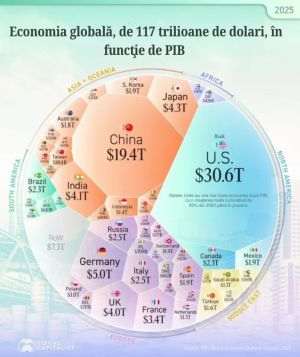The fiscal changes that the Government would like to approve in the next period to reduce the state deficit are not consistent with the data on the 5% decrease in consumption - a decrease that started as early as May - and with the expectations of entrepreneurs, Florin Jianu said. the president of the National Council of Small and Medium Private Enterprises in Romania (CNIPMMR), during a press conference he held yesterday.
"In these moments when a crisis is expected, there is no need for these measures such as the VAT increase, which will lead to an increase in prices and a decrease in consumption. From the discussions I had with the representatives of the European Commission, they do not request this, but, first of all, the efficiency of budget spending. (...) We see a dissolution of the state during this period, it seems that the state is adrift, out of control and entrepreneurs are asking what happens to the money paid by small and medium-sized companies to the state budget, in the form of fees and taxes" , said Florin Jianu.
The President of CNIPMMR specified that only micro-enterprises - for which the Government wants to introduce new taxation thresholds - brought to the state budget over 18 billion lei from taxes and fees paid on salaries last year, an amount to which 3.75 billion lei was added with income tax title.
The representative of small and medium-sized entrepreneurs showed that, in the absence of a clear collaboration with the Government regarding the future fiscal measures, CNIPMMR sent letters to the European Commission, the Government, the Parliament and the Presidency of Romania, in which they warn the Executive not to cross certain red lines in what concerns the desired fiscal reform.
It is about the principle according to which the reform should first start with the central and local public administration, about the entry into force of the new fiscal measures only on January 1, 2024 and not from September as the Government wants, about the consultation of the social partners, about the application of some rules simple and clear regarding the taxation of micro-enterprises, about the need to attract in the real economy the European funds allocated to our country through the PNRR and through the European multiannual financial framework 2021-2027, about supporting the hospitality industry, about a mechanism based on which to be established predictably, on 10 years, the minimum wage for the economy, the minimum wage to be established according to each sector of activity, and about the need to maintain the current system of holiday vouchers, which represents a big breath of oxygen for entrepreneurs in tourist resorts.
Regarding the reduction of the budget deficit and fiscal reform, Florin Jianu mentioned that European Commission officials want the Government to take the respective measures this year, because next year there will be several rounds of elections, which will prevent politicians from taking unpopular measures.
• Minimum wages differentiated by economic sector
However, the president of CNIPMMR showed that the representatives of the European Commission must take into account the current geopolitical situation of our country, the fact that we have supported Ukraine in all areas, especially in the transit of products from the neighboring country, which was done at the expense of farmers and Romanian producers.
Mr. Jianu reiterated that the fiscal changes must come into force only at the beginning of next year.
"As for the increase in taxes and fees, you can't tell a small entrepreneur that he has to change the payment of taxation now, especially since, from the discussions with accounting experts, we noted that such a change during the year would lead to doubling accounting. (...) It is not normal to constantly change the tax rules. We ask for long-term predictability, 10-20 years, regarding taxation", said Florin Jianu.
Regarding the minimum wage mechanism, the president of CNIPMMR said: "We have to start thinking about minimum wages by economic sector, depending on the activities carried out. You cannot set a minimum wage per economy of 3000 lei in the IT sector. Builders are also willing to pay more than the minimum wage in the economy. I think it's time to discuss differentiated salaries by economic sector".
He mentioned that, after the meetings these days of Prime Minister Marcel Ciolacu, in Brussels, with the officials of the European Commission, the representatives of the business environment in our country are waiting to have a last meeting with the head of the Government and the Minister of Finance regarding the fiscal measures that would follow to be adopted by the entire Ciolacu Cabinet assuming responsibility, the President of CNIPMMR expressed his hope that European Commission officials will agree to a reduction of only 0.5%-1% of the budget deficit, which instead of the deficit agreed in a few years ago, of 4.4%, it would be 5.5% of GDP at the end of this year.
• Multinationals, minimal contribution to the state budget
Another controversial measure is the one concerning the taxation of 1% of the turnover of multinational companies and companies whose turnover exceeds 100 million lei or 50 million lei - according to a recent post by social-democratic senator Daniel Zamfir.
Sterică Fudulea, the general secretary of CNIPMMR stated that according to an analysis carried out, multinationals contributed to the state budget in the period 2020-2022 with smaller amounts than those contributed by micro-enterprises.
"In 2020, 350 multinational companies had a turnover of over 100 million euros. In total, the 350 companies had a turnover of 624 billion lei, of which they paid 5.2 billion lei to the state budget, i.e. 0.78% of the total turnover. During this time, the micro-enterprises that had a total turnover of 204 billion lei paid 2.4 billion lei to the state budget, i.e. 1.2% of the total turnover. I note that 62 of those multinationals were loss-making, and 94 paid a tax of less than 1% of their turnover. In the top 10 large companies, we have only one company, which is Romanian and which paid a tax of 2.56% of the turnover", said Sterică Fudulea.
The general secretary of CNIPMMR mentioned that the authorities with control powers should check the situations where in the same group, a company declares losses on one activity, but pays lower taxes on another activity, and in which although the group declares a loss, one of companies pay low taxes.
Regarding the application of the 1% tax on the turnover when this figure exceeds 50 million euros, Florin Jianu, the president of CNIPMMR stated: "The application of such a measure should be balanced and calibrated. You cannot apply such a measure to all companies. You cannot apply a 1% tax for distribution companies that exceed the turnover of 50 million euros, because in this sector of activity the average profit rate is 0.48%".
The representative of small and medium-sized entrepreneurs also mentioned that, before taking certain fiscal measures, the state authorities must check unfair competition, showing that in this sense there is a need for field inspections by the Labor Inspection, ANAF and other institutions to discover and tax companies that use undeclared work, gray work or tax evasion, because these companies do not practice fair competition with other firms in the market.























































